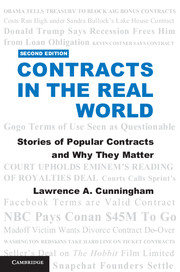Book contents
- Frontmatter
- Dedication
- Contents
- Annotated Contents
- Acknowledgments
- Introduction
- 1 Getting In: Contract Formation
- 2 Facing Limits: Unenforceable Bargains
- 3 Getting Out: Excuses and Termination
- 4 Paying Up: Remedies
- 5 Rewinding: Restitution and Unjust Enrichment
- 6 Writing It Down: Interpretation, Parol, Frauds
- 7 Performing: Duties, Modifi cation, Good Faith
- 8 Hedging: Conditions
- 9 Considering Others: Third Parties and Society
- Conclusion
- Appendix A Offering and Accepting
- Appendix B Buying and Selling Goods
- Notes
- Table of Cases
- Index
9 - Considering Others: Third Parties and Society
Published online by Cambridge University Press: 05 March 2016
- Frontmatter
- Dedication
- Contents
- Annotated Contents
- Acknowledgments
- Introduction
- 1 Getting In: Contract Formation
- 2 Facing Limits: Unenforceable Bargains
- 3 Getting Out: Excuses and Termination
- 4 Paying Up: Remedies
- 5 Rewinding: Restitution and Unjust Enrichment
- 6 Writing It Down: Interpretation, Parol, Frauds
- 7 Performing: Duties, Modifi cation, Good Faith
- 8 Hedging: Conditions
- 9 Considering Others: Third Parties and Society
- Conclusion
- Appendix A Offering and Accepting
- Appendix B Buying and Selling Goods
- Notes
- Table of Cases
- Index
Summary
With friends like these, who needs enemies?
– English proverbBeneficiaries: Supply Chain Abuse at Wal-Mart
Wal-Mart, the world's largest retailer, procures supplies globally, including from factories in such countries as Bangladesh, China, Indonesia, Nicaragua, and Swaziland. The retailer has publicly committed to promoting compliance with local labor laws designed to protect employees against sweatshop working conditions. Such laws address minimum and overtime pay and maximum hours and ban forced labor. Wal-Mart has included terms requiring suppliers to comply with these local laws in its foreign supply agreements. These contracts authorize Wal-Mart to inspect factories for compliance and to terminate suppliers in violation. Wal-Mart also publicly proclaims that in countries with lax law enforcement, the company is the de facto law enforcement agent.
In 2005, employees of foreign suppliers sued Wal-Mart for its failure to enforce its own labor standards. Employees alleged that Wal-Mart does not adequately monitor suppliers and knows of suppliers’ routine violation of local labor laws. According to the employees, fewer than 10 percent of Wal-Mart's inspections of its suppliers are unannounced, workers are coached on how to respond, and Wal-Mart's inspectors are pressured to produce positive reports despite factory violations. The employees claimed that Wal-Mart's promise to monitor suppliers’ compliance with local labor laws meant that Wal-Mart intended to confer a benefit on employees, even though they are not parties to the contracts. Wal-Mart countered that the employees, strangers to these contracts, had no right to enforce them and, in any event, the company had made no promises of any kind.
The employees saw themselves as being on the right side of history, marking progress in a centuries-long struggle to recognize interests of third parties to contracts. Until the mid-nineteenth century, courts were averse to allowing third parties any enforcement rights in contracts to which they were strangers. Thus, the only people who could enforce contract rights were those who made them.
Resistance to letting strangers enforce contract rights began to weaken with the landmark 1859 case, Lawrence v. Fox. Holly owed money to Lawrence and loaned the same amount to Fox, getting Fox's promise to repay that sum to Lawrence.
Information
- Type
- Chapter
- Information
- Contracts in the Real WorldStories of Popular Contracts and Why They Matter, pp. 221 - 239Publisher: Cambridge University PressPrint publication year: 2016
